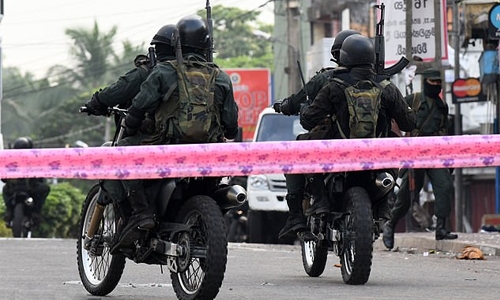It’s not too late to bridge the divides in Sri Lanka — but it won’t be easy
In the days since terrorists carried out attacks on churches and hotels in Sri Lanka on Easter Sunday, a series of violent reprisal attacks have targeted the country’s Muslim community. The assaults intensified during the week of May 13, when marauding mobs torched Muslim homes, businesses and places of worship, compelling the Sri Lankan authorities to order a nationwide curfew. These attacks are alarming not only because of their intensity, but because they threaten to aggravate the societal divides in Sri Lanka that helped fuel a brutal, 26-year civil war that ended a decade ago.
The schisms during that conflict were different than those playing out today. During the civil war, militants representing the Tamil ethnic minority fought against the ethnic Sinhalese-dominated state for the right to a separate homeland. Today, the tensions are religious in nature, between Sri Lanka’s majority Buddhists, who have staged the violent reprisals, and the Muslim minority. But the broader issues of communal tensions and violence remain the same.
Unfortunately, this is exactly what Daesh, the sectarian-minded terror group that claimed responsibility the Easter massacre, wants to achieve and exploit: Different societal groups pitted against each other, violently. To its credit, the beleaguered Sri Lankan government — which has come under fire for not acting on multiple intelligence reports that warned of the Easter Sunday attack in advance — has said and done the right things in response. Leading officials have called for calm and unity. Security forces have cracked down on those involved in the anti-Muslim violence, crackdowns that have been particularly robust since Sri Lanka declared a state of emergency the day after the Easter attack, which gives it full (critics would say excessive) powers to act against those suspected of violence.
And yet, there are three reasons to fear that Sri Lanka’s communal tensions could worsen and even spiral out of control, despite the best efforts of state and civil society to bring the country together. Firstly, the virulent Buddhist nationalism that has fuelled anti-Muslim attacks not only in recent days but also in the months preceding the Easter Sunday attacks, is a clear and present danger. Buddhist extremist groups in Sri Lanka have been around for quite some time and have generally been treated with kid gloves — if not openly supported — by Sri Lankan political leaders. These groups advocate for, and carry out, violent acts against Muslims.
This phenomenon is also seen in Myanmar, where nasty anti-Muslim ideologies spouted by radical Buddhist monks have contributed to the environment that led to the Myanmar military’s assaults on the Rohingya Muslim community. Until the Sri Lankan authorities take irreversible steps to expunge the scourge of Buddhist extremism, communal violence will continue to flare. Secondly, in Sri Lanka, social media — one of the great double-edged swords of our time — is a powerful purveyor of the toxic narratives that fuel communal violence. We all know the power of social media; it has the ability to instantaneously spread news far and wide.
This is a good thing when it is spreading important information, from warnings about incoming flash floods to tips on where to vote on election day, and many other useful things in between. But social media’s clout when it comes to information dissemination is a very bad thing when that information consists of fake news or other provocations that prompt violence. Indeed, reports abound that social-media posts played a role in triggering the anti-Muslim violence recently seen in Sri Lanka — just as they did in 2017, when false rumors spread about Muslims planning to attack a sacred Buddhist monument.
Of course, this nefarious use of social media to trigger unrest is part of a wider problem that plays out across the globe. In Sri Lanka, officials banned social-media platforms after the Easter attacks to reduce the likelihood that they would be used to incite retaliatory violence. But banning the platform will not solve the underlying problem, as the violence of recent days makes painfully clear. Thirdly, Sri Lanka’s political situation heightens the risk of increased communal tensions and violence. The country faces an election later this year.
With emotions from the Easter Sunday attack sure to remain high for some time, leaders of the current government might find it politically expedient to resort to increasingly tougher rhetoric (and actions) toward Muslims. Indeed, given that a leading presidential candidate, Gotabhaya Rajapaksa, has been associated with hard-line Buddhist nationalist causes, politicians aspiring for high office might calculate that such ugly talk could strengthen their electoral position. This is not to say Sri Lanka cannot step back from the precipice.
Sri Lankans — both the state and society — know all too well the bloody consequences of letting widening societal divisions go unaddressed. This painful legacy of past tragedy provides a powerful incentive to take corrective measures that can bridge divides and generate stability. But given Sri Lanka’s troubling trend lines, it will not be easy.
Related Posts

